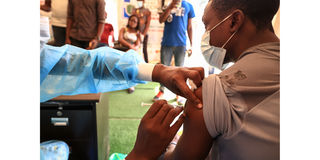Africa Cup of Nations throws up Covid jab dilemma

A nurse administers a Covid-19 vaccine to a person at the Palais des Sports vaccination centre in Yaounde on January 6, 2022. A Covid-19 vaccine is one of the keys to being able to go to the stadium and cheer on the Cameroonian team, the host country of the African Cup of Nations (CAN) of soccer. Many Cameroonians are overcoming their reluctance to be vaccinated, one of the two conditions to attend the games, in addition to a negative PCR test of less than 72 hours or antigenic test of 24 hours.
What you need to know:
- The African Football Confederation (CAF) has made vaccination mandatory to enter the stadium, along with a negative PCR test taken less than 72 hours before kick-off or an antigen test up to 24 hours before
- In the central African country of 27 million people, just six percent of the population over the age of 18 has been jabbed, according to official statistics, and many people openly refuse to wear masks
- In Yaounde, vaccination requirements for would-be spectators have stirred resentment
Yaoundé
"If I get the jab, it's just for the Indomitable Lions. I'm ready to die for them," says Vincent Nemgne as he receives a coronavirus vaccine to see Cameroon open Africa's top football tournament.
In the week before Sunday's first match in the Africa Cup of Nations (CAN) in Cameroon, many fans have overcome reluctance and asked to be vaccinated.
The African Football Confederation (CAF) has made vaccination mandatory to enter the stadium, along with a negative PCR test taken less than 72 hours before kick-off or an antigen test up to 24 hours before.
"There is clearly a CAN effect. We have gone from 10 people a day to more than 100 since Monday. This is increasing exponentially," Lucien Mama, coordinator of the Sports Palace of Yaounde vaccine centre, told AFP.
"Until now, Cameroonians have refused to be vaccinated. The CAN has broken the psychological barriers and the hesitation," Mama added hopefully.
In the central African country of 27 million people, just six percent of the population over the age of 18 has been jabbed, according to official statistics, and many people openly refuse to wear masks.
But stringent stadium entry requirements imposed by CAF could still deter supporters from attending matches.
On Tuesday, it was announced stadium attendances would be limited to 60 percent of capacity -- increasing to 80 percent when the Indomitable Lions play.
'I will not go'
Next to the Sports Palace in the capital Yaounde, several dozen fans waited to get jabbed in tents.
"I came to see how it goes," said Yaya Bachirou, 33. "I agree to be vaccinated only if I have my ticket for the match, and for the moment I do not have it yet."
"For 15 minutes you sit and you don't talk," a nurse instructs a patient after the injection. "And you won't have sex today either," jokes her colleague.
Rumours that the vaccine causes sterility are widely believed, alongside several other myths.
"The reluctance to be vaccinated is linked to a combination of factors," explains Larissa Kojoue, a researcher at Buea University in western Cameroon.
"It is firstly linked to ignorance about this still-recent disease, to the sometimes chaotic handling of the epidemic in the country, and to disinformation," Kojoue said.
"That has come mainly from Europe and the United States, and... reached a large part of the population, starting with the elites."
In Yaounde, vaccination requirements for would-be spectators have stirred resentment.
"I wanted to go to support the Indomitable Lions. We have been waiting for this moment for 50 years. But I will not go because I do not want to be vaccinated," protested Amougou who gave only his first name as he shopped in the central market.
"They give a product so that African women no longer give birth!"
Dylan, a 20 year old electronics retailer, said "if the vaccination is compulsory, I will not go to the stadium unfortunately".
"I will not be vaccinated for each variant and I do not want to be injected with a liquid that I do not know," he said.
'I was disgusted'
In a small bar popular with football fans, the disappointment is palpable among the regulars, almost all of whom are unvaccinated.
"I was disgusted with this decision. I was very excited about going to the stadium with my family, and now I am preparing to watch on television," lamented Joel Nkamdem, the finance director of APEJES Academy of Mfou, a Yaounde club in the the top-flight Elite One national league.
"It's very unfair because vaccination is voluntary. Covid kills fewer people than malaria or typhoid fever and we have our own remedies. Furthermore, some vaccinated people still have the disease," he adds.
Everyone interviewed by AFP said they expected stadiums to be filled regardless.
"We always find solutions," a young man in his twenties said mischievously, a green Cameroon jersey on his back.
Patrice Motsepe, the president of CAF, said he was aware of "false tests" spreading, but insisted the pan-African organisation was "dealing with these problems".
"Some spectators think they can use false vaccination certificates to access the stadium," says Yap Boum, an epidemiologist and head of Yaounde's Medecins Sans Frontieres (Doctors Without Borders) research centre.
"But devices with the health pass and the QR code are sufficiently robust to avoid it."





